 Petzlover
Petzlover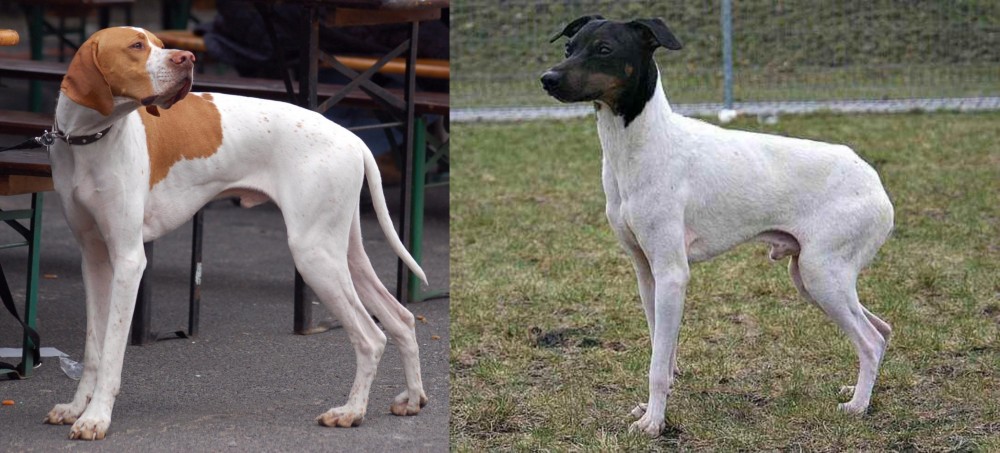 English Pointer is originated from United Kingdom but Japanese Terrier is originated from Japan. English Pointer may grow 37 cm / 15 inches higher than Japanese Terrier. English Pointer may weigh 29 kg / 64 pounds more than Japanese Terrier. Both English Pointer and Japanese Terrier has almost same life span. English Pointer may have more litter size than Japanese Terrier. Both English Pointer and Japanese Terrier requires Low Maintenance.
English Pointer is originated from United Kingdom but Japanese Terrier is originated from Japan. English Pointer may grow 37 cm / 15 inches higher than Japanese Terrier. English Pointer may weigh 29 kg / 64 pounds more than Japanese Terrier. Both English Pointer and Japanese Terrier has almost same life span. English Pointer may have more litter size than Japanese Terrier. Both English Pointer and Japanese Terrier requires Low Maintenance.
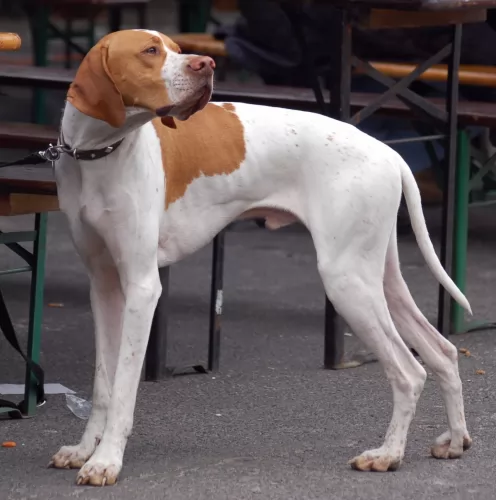 We can find records for pointers from 17th century. Breeds such as Old Spanish and Portuguese Pointer were set in to England from European Mainland. In 1800s they were brought to America and then they slowly developed their hunting skills and in 1910 they became an excellent bird hunter. In 1936 Modern American Kennel was established and they bred pointers in large quantities. They are very popular in southern United States and are called as "bird dog". Pointers are good in hunting birds like pheasant and grouse. They got their name because of their special skills in hunting.
We can find records for pointers from 17th century. Breeds such as Old Spanish and Portuguese Pointer were set in to England from European Mainland. In 1800s they were brought to America and then they slowly developed their hunting skills and in 1910 they became an excellent bird hunter. In 1936 Modern American Kennel was established and they bred pointers in large quantities. They are very popular in southern United States and are called as "bird dog". Pointers are good in hunting birds like pheasant and grouse. They got their name because of their special skills in hunting.
 The Japanese Terrier is native to Japan and is a rare pure bred dog. It is believed that the dog comes from Smooth Fox Terriers who arrived way back in the 17th century.
The Japanese Terrier is native to Japan and is a rare pure bred dog. It is believed that the dog comes from Smooth Fox Terriers who arrived way back in the 17th century.
Certainly he looks very much like a regular Fox Terrier. It is thought that these smooth Fox Terriers were then interbred with local, Japanese dogs and used to hunt rats. Gradually he became a lap dog and companion.
Planned breeding of the dog began in 1920, and it was in 1930 that the dog was admitted to the Japanese Kennel Club with a breeding program being started.
Today you will find the Japanese Terrier in his home country and small numbers elsewhere. He was admitted to the United Kennel Club in 2006.
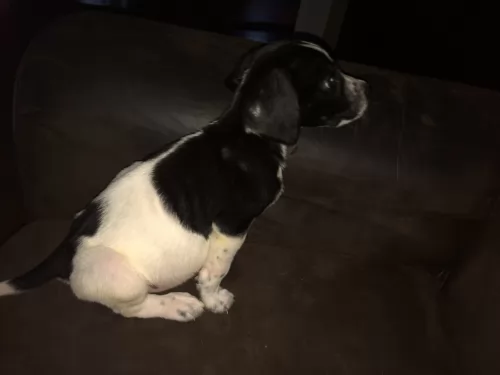 Pointer has a long head and its body is perfectly suitable for hunting. In hunting the pointers shows hunter the direction of the bird and also they will go and get them after they were shot. They are well known for their speed, energy and continuous working. Pointers are also a good companion dog and love the family members so much. It is very easy to groom them as they have short coat. They are very alert and excellent watch dog.
Pointer has a long head and its body is perfectly suitable for hunting. In hunting the pointers shows hunter the direction of the bird and also they will go and get them after they were shot. They are well known for their speed, energy and continuous working. Pointers are also a good companion dog and love the family members so much. It is very easy to groom them as they have short coat. They are very alert and excellent watch dog.
If pointer is not set in huntng then they should be given lots of exercise daily. Pointers love to play and run with children. They will give a good company for cyclists. Pointers show their talents in dog shows especially in obedience and field trials. They will not worry about the crowd surrounding them and performs well. In performing at public, pointer will show perfect attention to its master. Pointer must be trained slowly from its puppyhood to get good results.
 The Japanese Terrier is a small sized dog who stands at 20 – 33cm at the shoulders and weighs in at about 2 to 5kg.
The Japanese Terrier is a small sized dog who stands at 20 – 33cm at the shoulders and weighs in at about 2 to 5kg.
He is a short, smooth haired dog with a tight skin and in colors of white and black. Sometimes you may find a little bit of tan color on the face too as well as 'freckles' around the neck area and legs. The black shading of the coat is essentially found around the head of the dog and also his ears.
His ears are set high on the head and are semi-erect, semi-floppy. The tail has always been traditionally docked, giving the dog a nice compact look but these days it is unfortunately often left long and then its a medium length tail which is thinly covered in short hair. The nose is black and the eye are brown, bright and alert.
Gentle, cheerful, intelligent, loving and loyal are some of the characteristics of the Japanese Terrier. People who have kept him as a pet will vouch for him being a wonderful companion.
He is an active dog, but he still loves to be petted and won’t do well if left alone and not part of his human family. Being a clever dog, he is easy to train, learning easily and quickly. He is quite amusing at times and you can even teach him some tricks.
He gets on well with other pets in the home as well as with children. He is alert and will make a good watchdog, alerting you to an intruder.
Because of the Japanese Terrier’s small size and sensitive nature, this breed needs a calm owner and a quiet household. It is not recommended for boisterous households.
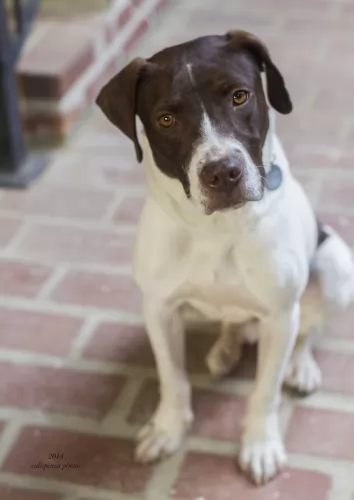 Pointer is a wonderful kid friendly dog and a nice companion. Also he is very energetic,fun-loving and an excellent watchdog. Pointers are very courageous as well as obedient. They can work for a very long time. Early socialization will make them with a good behaviour.
Pointer is a wonderful kid friendly dog and a nice companion. Also he is very energetic,fun-loving and an excellent watchdog. Pointers are very courageous as well as obedient. They can work for a very long time. Early socialization will make them with a good behaviour.
They will be happy if they are given a fenced yard to play and spend their natural energy. They will not have a good behaviour in apartment living. Pointers always likes to be with some one in his family. They are suitable for areas having hot weather and they will not do better in cold weather.
Pointers have very high intelligence and thus they are very easy to train. Good behaviours must be taught to them and the main word they must learn is "NO". They should stop what they are doing when they hear the word "NO" from you. "Sit" is another important word they should learn. Training should be given friendly and not compelling them to do it. Giving reward to them will make them happy and give more interest in training.
 As a pet of yours, the Japanese Terrier is an animated, contented little dog. He loves playing games and gets on well with children who aren't rough and disrespectful of him.
As a pet of yours, the Japanese Terrier is an animated, contented little dog. He loves playing games and gets on well with children who aren't rough and disrespectful of him.
He is smart and gentle and loves nothing more than to sit on your lap in the evenings and be your reading- or watching-TV companion. Give him the right amount of attention as any other family member receives and he is guaranteed to make you an excellent, low maintenance pet.
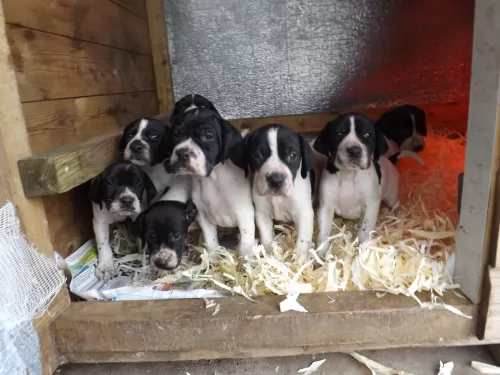 Pointers face health problems such as gastric torsion, hypothyroidism and canine hip dysplasia. Overweight will also lead to many health problems in them. Other problems seen in them are cardiomyopathy, ectropion and progressive retinal atrophy.
Pointers face health problems such as gastric torsion, hypothyroidism and canine hip dysplasia. Overweight will also lead to many health problems in them. Other problems seen in them are cardiomyopathy, ectropion and progressive retinal atrophy.
They have the chances to get several skin disorders which leads to hairfall. Follicular Dysplasia is a hereditary disorder which causes hairfall. Special shampoos or lotion to combat the dry skin should be used to overcome this problem.
 The Japanese Terrier has no particular health issues and has a lifespan of 12 – 15 years if looked after well.
The Japanese Terrier has no particular health issues and has a lifespan of 12 – 15 years if looked after well.
There are always one or two illnesses to watch out for such as eye- and ear infections. Some dogs also develop conditions such as Patella Luxation. This happens when your dog's kneecap is dislocated. It can only be returned to its normal position when certain muscles in the back legs are relaxed and lengthened.
With this condition, your dog holds up one of his hind legs. This condition is more prevalent in small dog breeds.
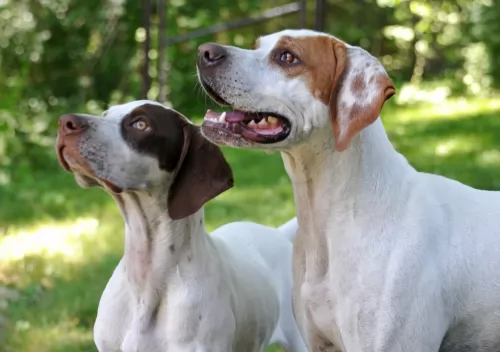 Normally puppies require more food when compared with adult to meet their growth needs. The food given to the pointer puppy must contain vitamins, carbohydrates and minerals. Also the food given to his mother should be continued to the puppy as to avoid digestive problems for the puppy. If it is needed to change the food then it should be done in a step by step process.
Normally puppies require more food when compared with adult to meet their growth needs. The food given to the pointer puppy must contain vitamins, carbohydrates and minerals. Also the food given to his mother should be continued to the puppy as to avoid digestive problems for the puppy. If it is needed to change the food then it should be done in a step by step process.
Pointer can be fed one or two times a day. Usally small meal is given in morning and full meal will be given in the evening. But in case if they will be left alone for the whole day then morning food shall be a full meal. They can be fed meat of goat, pork, fish and woodcock. Brown rice is a good food for pointer.
Pointers will be happy if they are always with their family. They enjoy when they are taken outside for playing or camping. Puppies don't need much exercise as adults need. Adults should not be fed too much as it will lead to overweight.
When pointer is given proper exercises and training they will be a very good mannered dog. They are very active and intelligent dogs and hence require exercise and training regularly. The breed was developed to be a hunting dog and can work continuously in a day. Pointers should be exercised a minimum of an hour per day. They will be happy to run along with your bicycle and playing frisbee with you.
 The Japanese Terrier is an active dog and will require exercise every day. He’ll love to join you on your walks or have ball games in your garden. He can adapt to life in the city or in the country but will always need to have good exercise.
The Japanese Terrier is an active dog and will require exercise every day. He’ll love to join you on your walks or have ball games in your garden. He can adapt to life in the city or in the country but will always need to have good exercise.
The Japanese Terrier is a medium shedder and you want to be sure then to brush him twice a week to get rid of all those loose hairs.
The Japanese Terriers will require the best commercially manufactured dog food, and instead of one large meal a day, rather feed him 2 smaller meals. You can mix some tasty home-made food into his dry kibble from time to time. Excellent home-made food would be something like cooked chicken, brown rice or pasta and some vegetables.
If you can, try to also include some raw meat occasionally. If you’re in any doubt as to how to feed your Japanese Terrier so that he remains healthy, speak to your veterinarian.
Your dog should never ever be without a continuous supply of fresh, cool drinking water.